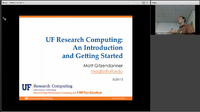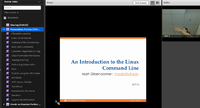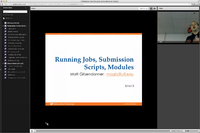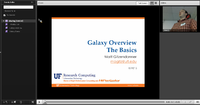Difference between revisions of "Training"
| Line 1: | Line 1: | ||
[[Category:Training]] | [[Category:Training]] | ||
| − | At | + | ==Training Overview== |
| − | + | At UF Research Computing we strive to make our resources accessible, efficient, and easy to use. An important part of the effective research computing is the knowledge of how to apply the many available tools in a productive and efficient manner. The comprehensive and clear documentation, well-structured training, and individual help that we provide are all means of achieving that goal. We run a series of training sessions and tutorials during each semester of the school year and in the Summer. | |
| − | |||
Please see the schedule of training sessions and other Research Computing events below. Please check the calendar before a session as the schedule may change. | Please see the schedule of training sessions and other Research Computing events below. Please check the calendar before a session as the schedule may change. | ||
| − | + | ==Training Schedule== | |
{{#widget:Google Calendar | {{#widget:Google Calendar | ||
|height=400 | |height=400 | ||
| Line 18: | Line 17: | ||
| − | ==Resources== | + | ==Training Resources== |
| − | The most recent set of slides and | + | The most recent set of slides, handouts and recordings from training sessions are listed below. |
*'''UF Research Computing: An Introduction and Getting Started''' | *'''UF Research Computing: An Introduction and Getting Started''' | ||
| Line 67: | Line 66: | ||
**Speaker: Dr. Charles Taylor | **Speaker: Dr. Charles Taylor | ||
**Download [[Media:HPC_IntroToGPUs_130422.pdf|the slides]] from the presentation. | **Download [[Media:HPC_IntroToGPUs_130422.pdf|the slides]] from the presentation. | ||
| + | |||
| + | |||
| + | ==Additional Training Opportunities== | ||
| + | In addition to the training sessions coordinated by UF Research Computing, we are aware of many training opportunities provided by other institutions and vendors. These are listed below. | ||
| + | |||
| + | ===Intel Software Tools Technical Webinar Series=== | ||
| + | This free webinar series presents tools, tips, and techniques that will help sharpen your development skills on developing and improving your high performance compute applications for multicore and manycore on Intel® Xeon® processors and Intel® Xeon Phi™ coprocessors. Expert technical teams at Intel as well as open source innovators discuss development tools, programming models, vectorization and execution models that will get your development efforts powered up to get the best out of your applications and platforms. | ||
| + | |||
| + | Full schedule and registration information is available [http://software.intel.com/en-us/articles/intel-software-tools-technical-webinar-series here]. | ||
| + | |||
| + | |||
| + | ===XSEDE=== | ||
| + | The ''Extreme Science and Engineering Discovery Environment'' [https://portal.xsede.org/online-training online training] mostly lists html tutorials offered at the [http://www.cornell.edu/ Cornell University]. Offered tutorials cover general programming, scripting, parallel programming (concepts, message passing interface (MPI), openmp), visualisation, code improvement, and other topics. | ||
| + | |||
| + | The [https://portal.xsede.org/course-calendar XSEDE Training Calendar] includes many useful webcasts that are provided by a number of institutions. For most events registration is required. | ||
| + | |||
| + | ===TACC=== | ||
| + | |||
| + | Many TACC online training sessions are webcast and are listed in the XSEDE Training Calendar above. Training materials, recordings and webcasts are available from the [http://www.tacc.utexas.edu/user-services/training/course-materials TACC Course Materials site]. | ||
Revision as of 14:35, 7 October 2013
Training Overview
At UF Research Computing we strive to make our resources accessible, efficient, and easy to use. An important part of the effective research computing is the knowledge of how to apply the many available tools in a productive and efficient manner. The comprehensive and clear documentation, well-structured training, and individual help that we provide are all means of achieving that goal. We run a series of training sessions and tutorials during each semester of the school year and in the Summer.
Please see the schedule of training sessions and other Research Computing events below. Please check the calendar before a session as the schedule may change.
Training Schedule
Training Resources
The most recent set of slides, handouts and recordings from training sessions are listed below.
- UF Research Computing: An Introduction and Getting Started
- Download the slides from the presentation.
- View a recording of the session

- An Introduction to the Linux Command Line
- Download the slides from the presentation.
- Download the handout with the exercises
- Download an example Linux cheat sheet.
- View a recording of the session

- Running Jobs, Submission Scripts, Modules
- Download the slides from the presentation.
- Download a zip file with the example scripts.
- View a recording of the session

- Galaxy Overview: The Basics
- Download the slides from the presentation.
- View a recording of the session

- Next Generation Sequencing Data Techniques: Reference-Based Mapping and de Novo Assembly
- Download the slides from the presentation.
- Download the handout with the exercises.
- Introduction to Molecular Dynamics Simulations with AMBER
- Speaker: Dr. Dhruva Chakravorty
- Download the slides from the presentation.
- Next Generation Sequencing Data Techniques: General Methods and Tools
- Download the slides from the presentation.
- Download the handout with the exercises.
- Download the shell command log from the demo.
- Phylogenetic Analyses
- Download the slides from the presentation.
- Introduction to GPUs
- Speaker: Dr. Charles Taylor
- Download the slides from the presentation.
Additional Training Opportunities
In addition to the training sessions coordinated by UF Research Computing, we are aware of many training opportunities provided by other institutions and vendors. These are listed below.
Intel Software Tools Technical Webinar Series
This free webinar series presents tools, tips, and techniques that will help sharpen your development skills on developing and improving your high performance compute applications for multicore and manycore on Intel® Xeon® processors and Intel® Xeon Phi™ coprocessors. Expert technical teams at Intel as well as open source innovators discuss development tools, programming models, vectorization and execution models that will get your development efforts powered up to get the best out of your applications and platforms.
Full schedule and registration information is available here.
XSEDE
The Extreme Science and Engineering Discovery Environment online training mostly lists html tutorials offered at the Cornell University. Offered tutorials cover general programming, scripting, parallel programming (concepts, message passing interface (MPI), openmp), visualisation, code improvement, and other topics.
The XSEDE Training Calendar includes many useful webcasts that are provided by a number of institutions. For most events registration is required.
TACC
Many TACC online training sessions are webcast and are listed in the XSEDE Training Calendar above. Training materials, recordings and webcasts are available from the TACC Course Materials site.